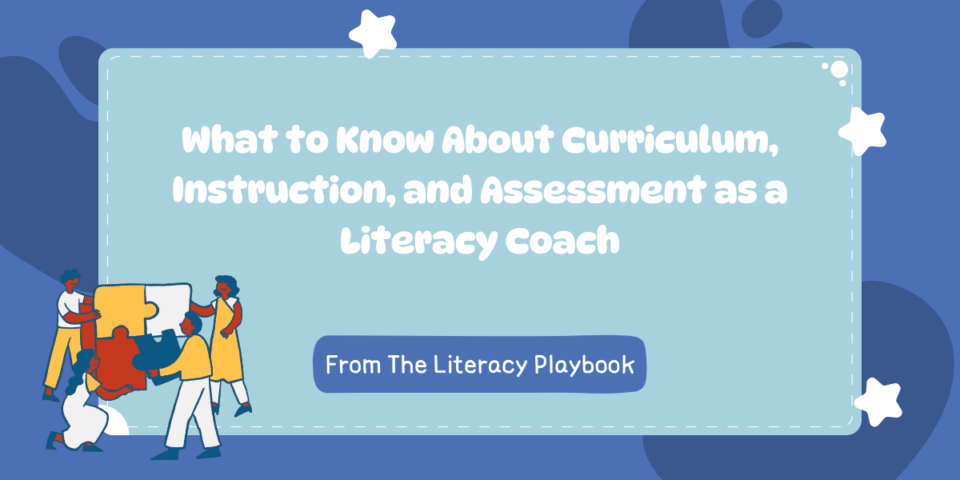
The following is adapted from Your Literacy Coaching Playbook.
At the top of your list of things to know as a literacy coach is a deep understanding of your school’s literacy curriculum, instructional practices, and assessment system. Here’s what you need to know about this powerful triad.
What to Know About the Literacy Curriculum
- Alignment to State and National Standards: You’ll need to be very familiar with your state’s academic standards as well as any other standards that are used in your school and how your school’s current literacy curriculum aligns to them. And, because assessments—especially standardized assessments—are designed to test how well students are meeting grade-level expectations, you’ll need to have a good grasp of those expectations in the areas of reading, writing, speaking, and listening. You will need to stay abreast of new standards as they are published.
- Content Knowledge: To be current on evidence-based research related to literacy, you need to have a thorough understanding of the essential components of literacy (oral language development, phoneme awareness, phonics, fluency, vocabulary, comprehension, writing, engagement, and motivation) as well as the content of literacy curriculum materials, including the texts students will read and the genres they will explore.
- Differentiated Instruction: As a literacy coach, you should have a strong understanding of how the curriculum can be adapted to meet students’ diverse needs, including those of multilingual learners, students with learning or physical disabilities, neurodivergent thinkers, and children who are working above grade level. You also should be experienced in selecting or adapting curriculum to meet the standards of a culturally relevant curriculum.
What to Know About Evidence-Based Literacy Instruction
- Understanding of Literacy as a Complex Process: You need to develop a strong understanding of behaviors that show evidence of students’ strengths and needs in literacy processing, the demands of different types of texts on readers, and the characteristics of effective writing. Your deep knowledge of how the sounds of language map onto the letters of the language is essential in supporting teachers’ understanding of phonics and word study across the grades. And your deep knowledge of literacy processing will ground all professional learning in teachers’ understanding of reading and writing development and how their teaching decisions influence learning.
- Instructional Approaches: Stay abreast of research-based instructional approaches so you can help teachers learn and apply them with students. While tried and true approaches, such as direct instruction, project-based instruction, inquiry-based learning, and cooperative learning, are still quite useful, the research base is always evolving. You should also be well versed in emerging technologies like artificial intelligence (AI) so you can respond knowledgably to teachers’ ideas about integrating technology in their instructional plans.
- Intervention Practices: Be sure you know how to help teachers implement frameworks for Multi-Tiered Systems of Support centered on equity, early intervention, and social-emotional supports for students who are struggling with reading and writing.
- Technology: Technology capabilities change by the day and have many implications for literacy and learning. Many teachers working in schools today are digital natives, who grew up using technology in their daily lives. These teachers are likely familiar with digital tools and resources such as software, apps, and online platforms for teaching reading and writing. If using technology doesn’t come easily to you, it might be a good idea to take an online course or read up on emerging technologies and their implications. You might need to consult with your district technology specialist to support teacher learning related to literacy implications.
- Professional Learning: As a leader of professional learning in your school, you need to understand standards for professional learning and how to provide ongoing, job-embedded, content-based professional learning opportunities for teachers. You also need to know how to model effective instructional practices and how to provide guidance and feedback that can expand the expertise of all teachers.
What to Know About Assessment
- Diagnostic Assessments: These assessments are designed to identify students’ literacy strengths and needs, which can inform instruction. You should understand how to administer and interpret a variety of diagnostic assessments—reading, writing, phonics and word study, language competency—so you can help teachers learn how to use them efficiently and use the information to tailor their teaching decisions.
- Progress Monitoring: It’s important for you to be very familiar with the techniques and tools for monitoring students’ learning progress over time, including students who are receiving intervention services.
- Formative and Summative Assessments: Be sure you understand the differences between and the application of formative assessments (ongoing, informal checks on student learning) and summative assessments (end-of-year or end-of-unit evaluations).
- Standardized Tests: Standardized tests are currently required of all public-school students in state and local jurisdictions. These externally validated measures of achievement help schools rate the progress of their students compared with other students locally and nationally. Although imperfect in some ways, standardized tests do hold schools accountable for improving student outcomes. As literacy coach, you need to know how to prepare both students and teachers for these assessments, though not at the expense of broader literacy teaching.
- Data Monitoring Tools: These tools include detailed records of oral reading, observation notes, data walls, and various software programs. We have helped schools implement the use of data walls and find them to be very effective in analyzing individual and group data for needs, strengths, and patterns among students. They are especially helpful in identifying achievement disparities among particular groups of students and determining what actions are required to ensure that all children are academically successful. As a literacy coach, you’ll want to share trends in data regularly with administrators, grade-level teams, and individual teachers, though not at the expense of broader learning, deeper understanding, and professional application.
The only coaching handbook you’ll need, filled with actionable advice and classroom examples.



